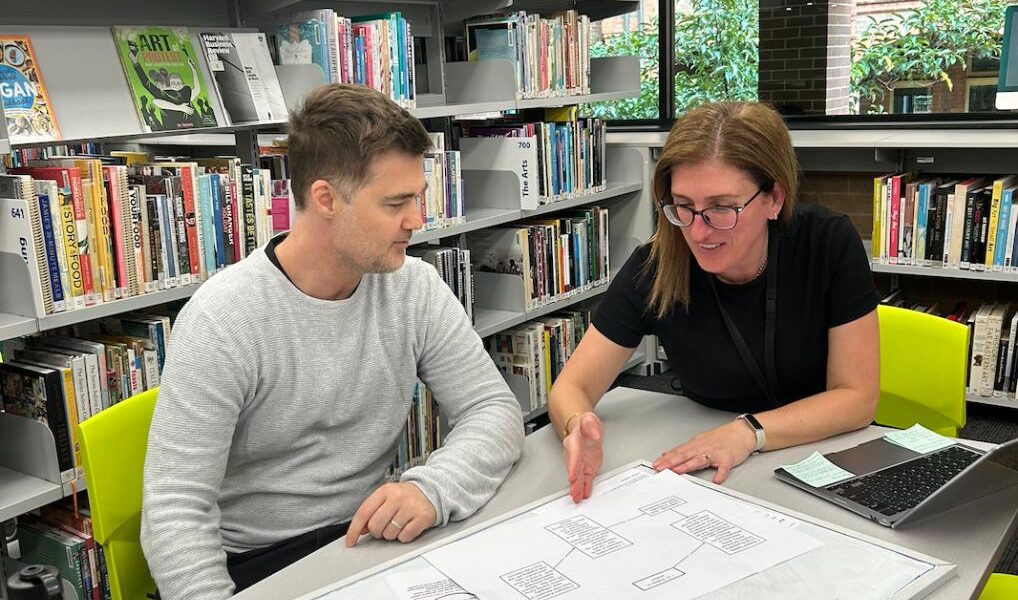Empowering the future: Rosanne Sukkar’s mission to demystify AI and inspire innovation
Staff Story
Rosanne Sukkar, Dean of Enterprise and Innovation, is on a mission to reshape how students, staff and parents engage with technology – especially artificial intelligence. With a background in Computer Science and over two decades of teaching experience, Rosanne brings both technical expertise and a deep passion for empowering others to embrace the digital future.
In her Year 11 Enterprise Computing class (a new course), students dive into practical skills like data visualisation, big data analytics and user interface design. ‘It’s not just about coding anymore,’ Rosanne explains. ‘It’s about understanding data – how to analyse it, how to predict with it and how to use it meaningfully. These are transferable skills that apply to any profession.’
Rosanne is particularly passionate about encouraging girls and young women to pursue technology. ‘I want our girls to feel confident using and creating with technology,’ she says. ‘If women aren’t involved in the development of tech, their voices won’t be part of its implementation. Our girls are incredibly talented and they need to know that this space is for them too.’
Her commitment to innovation extends beyond the classroom. Every fortnight, Rosanne and her colleague Mark Strong of the English Department host a ‘TeachMeet’ for staff, introducing them to new AI tools and encouraging hands-on experimentation. Attendance is growing steadily, with staff discovering how AI can streamline tasks and deepen learning. ‘We’re not replacing creativity,’ she says. ‘We’re using AI to take care of the menial tasks – so we can spend more time with students and go deeper into their learning.’
P&F Association members also benefitted from Rosanne’s expertise this week when she presented to their General Meeting. She wants all of us to have the courage to experiment with AI, rather than risk being left behind in this rapidly evolving technology revolution.
Rosanne believes that critical thinking is key to using AI effectively. ‘Students need to understand the chain of thought – how AI arrives at an answer step by step. They need to be able to question it, validate it and use it with confidence.’
At the same time, Rosanne is clear-eyed about the risks and ethical challenges AI presents – especially in educational settings. ‘There are so many tools out there,’ she says. ‘How do teachers know what’s good for the classroom, what’s appropriate for the age group? No teacher wants to be breaking the rules or putting personal information at risk. They don’t want to put the students at risk.’ She acknowledges that some staff are cautious, and rightly so – it’s about duty of care. That’s why she’s focused on giving students, teachers and staff a foundational understanding of how AI works, and introducing tools that are safe, practical and beneficial in the classroom. Her approach ensures that students, parents and staff are not only tech-savvy but also thoughtful digital citizens.
Looking ahead, Rosanne is exploring a startup idea, provisionally called Boost – a wellness initiative she would like to create with student input – that blends enterprise education with mindfulness. ‘I want to create a space where students can unplug, maybe do some yoga and reset. After COVID, our younger students’ brains are wired differently. We need to nurture their wellbeing as much as their academic growth.’
At the heart of Rosanne’s work is a belief in real-world learning. Whether it’s teaching students to build websites, manage budgets, or analyse data, she’s preparing them not just for exams – but for life. ‘Universities aren’t asking for essays anymore,’ she says. ‘They want to see what you can create.’
Rosanne Sukkar is more than a teacher – she’s a trailblazer, a mentor and a passionate advocate for innovation. Through her leadership, students, parents and staff alike are learning to navigate the evolving world of AI with curiosity, confidence and creativity.

Rosanne Sukkar is pictured here with Mark Strong – her Action Research Project and TeachMeet collaborator
Victoria Harper
Editor